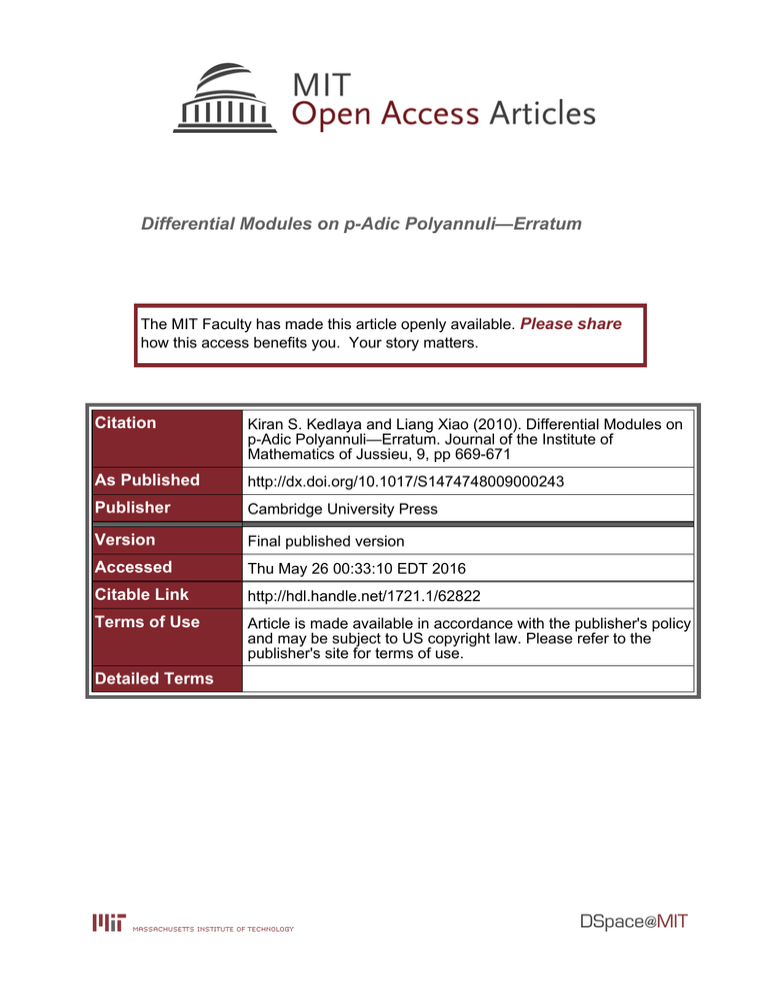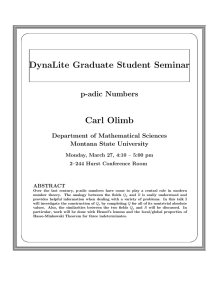Differential Modules on p-Adic Polyannuli—Erratum Please share
advertisement

Differential Modules on p-Adic Polyannuli—Erratum
The MIT Faculty has made this article openly available. Please share
how this access benefits you. Your story matters.
Citation
Kiran S. Kedlaya and Liang Xiao (2010). Differential Modules on
p-Adic Polyannuli—Erratum. Journal of the Institute of
Mathematics of Jussieu, 9, pp 669-671
As Published
http://dx.doi.org/10.1017/S1474748009000243
Publisher
Cambridge University Press
Version
Final published version
Accessed
Thu May 26 00:33:10 EDT 2016
Citable Link
http://hdl.handle.net/1721.1/62822
Terms of Use
Article is made available in accordance with the publisher's policy
and may be subject to US copyright law. Please refer to the
publisher's site for terms of use.
Detailed Terms
Journal of the Inst. of Math. Jussieu (2010) 9(3), 669–671
c Cambridge University Press 2010
doi:10.1017/S1474748009000243
669
ERRATUM
DIFFERENTIAL MODULES ON p-ADIC POLYANNULI—ERRATUM
KIRAN S. KEDLAYA AND LIANG XIAO
Department of Mathematics, Massachusetts Institute of Technology,
77 Massachusetts Avenue, Cambridge, MA 02139, USA
(kedlaya@mit.edu; lxiao@mit.edu)
doi:10.1017/S1474748009000085
Published online by Cambridge University Press, 19 May 2009.
The statement of Theorem 2.7.6 in the indicated paper is incorrect. For instance, if
m = 0 (i.e., the base field K contains no additional derivations), it is inconsistent with
Theorem 2.7.4 due to the distinction between intrinsic and extrinsic generic radii of
convergence. Theorems 2.7.12 and 2.7.13 are incorrect for similar reasons.
We will show here that all of these results become true under the following additional
hypothesis.
Hypothesis 1. Recall that the base field K has been assumed (in [2, Hypothesis 2.0.1])
to be a complete nonarchimedean field with residue field k of characteristic 0, equipped
with derivations ∂1 , . . . , ∂m which are of rational type with respect to the parameters
u1 , . . . , um ∈ K. We assume further that for each z ∈ K × with |z| = 1, there exists an
index j ∈ {1, . . . , m} with |uj ∂j (z)| = |z|.
Remark 2. The last condition in Hypothesis 1 is satisfied, for example, by the complete
discretely valued field K = k((T )) with ∂1 = d/dT .
We must check some stability properties of this hypothesis.
Lemma 3. Hypothesis 1 is preserved by replacing K by a finite extension K .
Proof . To check the condition of the hypothesis for some z ∈ (K )× with |z| = 1, we
may check it instead for z h for some positive integer h. We may thus assume that there
exists x ∈ K with |x| = |z|. Let P (T ) ∈ oK [T ] be a monic polynomial lifting the minimal
polynomial over k of the image of z/x in k . Put Q(T ) = P (T /x) = Qd T d + Qd−1 T d−1 +
· · · + Q0 , so that |Q(z)| < 1 and |zQ (z)| = 1.
Choose an index i for which |Qi z i | = 1, then choose j for which |uj ∂j (Qi )| = |Qi |.
d−1
From the definition of P , we deduce that | h=0 uj ∂j (Qh )z h | = 1; however, since Q(z)
670
K. S. Kedlaya and L. Xiao
maps to zero in k, so does
uj ∂j (Q(z)) = uj ∂j (z)Q (z) +
d−1
uj ∂j (Qh )z h .
h=0
Since |zQ (z)| = 1, we deduce that |uj ∂j (z)| = |z|, as desired.
Lemma 4. For any ρ > 0, Hypothesis 1 is preserved by replacing K by the completion
Fρ of K(t) for the ρ-Gauss norm.
Proof . To check the hypothesis for z ∈ Fρ× with |z| = 1, first choose x ∈ K with
|z| = |x|. We can then write z/x as a formal sum i∈Z ci ti with ci ∈ K, supi {|ci |ρi } = 1,
and |ci |ρi → 0 as i → −∞. There must exist an index i with |ci |ρi = 1; we can then
choose j for which |uj ∂j (ci x)| = |ci x|. Then |uj ∂j (z)| = |z|, as desired.
Lemma 5. Under Hypothesis 1, view F1 as a differential field equipped with ∂0 = ∂/∂t
together with ∂1 , . . . , ∂m . Then for any finite irreducible differential module V over F1
with intrinsic generic radius of convergence not equal to 1, there exists j ∈ {1, . . . , m}
such that ∂j is dominant on V .
Proof . By the proof of [1, Theorem 7.5.3], for some finite extension F1 of F1 , for each
irreducible component W of V ⊗F1 F1 , there exists r ∈ F1 such that E(r)⊗W has intrinsic
generic radius of convergence strictly greater than W . (Here E(r) is the differential
module with one generator v for which ∂j (v) = ∂j (r)v for all j.) In particular, we must
have |r| > 1. Choose some such W and r; by Lemma 3 and Lemma 4, there exists an
index j ∈ {1, . . . , m} such that |uj ∂j (r)| = |r|. For this j, ∂j is dominant on W , and
hence on V .
We see now that Theorem 2.7.6 holds under Hypothesis 1, as follows. In the notation
of that theorem, by Lemma 5, for each irreducible component of M ⊗ F1 , there is an
index j ∈ {1, . . . , m} for which ∂j is dominant on the component. In case we can make
a uniform choice of j (e.g. if m = 1), the claim follows from Theorem 2.7.4.
Otherwise, choose ρ ∈ (0, 1) with − log ρ < fi (M, 0), and let K be the completion of
K(w1 , . . . , wm , z) for the (1, . . . , 1, ρ)-Gauss norm, carrying the extra derivation ∂m+1 =
∂/∂z. Let F1 be the completion of K (t) for the 1-Gauss norm. Using Taylor series, we
define a continuous embedding of K into K taking uj to uj (1 + wj z) for j = 1, . . . , m;
we similarly embed F1 into F1 . Using this embedding, form the base extension M ⊗ F1 ,
and write ∂1 , . . . , ∂m
for the pullbacks of the actions of ∂1 , . . . , ∂m on M ⊗ F1 . Then for
j = 1, . . . , m, the action on ∂j on M ⊗ F1 is given by (1 + wj z)∂j , while the action of
m
∂m+1 on M ⊗ F1 is given by j=1 wj uj ∂j . We deduce that ∂m+1 is dominant on each
component of M ⊗ F1 , so we may thus argue as in the previous paragraph.
We may also establish Theorems 2.7.12 and 2.7.13 under Hypothesis 1, by using the
same construction as in the previous paragraph to reduce to Theorem 2.7.10.
Differential modules on p-adic polyannuli
671
References
1.
2.
K. S. Kedlaya, p-Adic Differential Equations (Cambridge University Press, in press;
draft available at http://math.mit.edu/˜kedlaya/papers/).
K. S. Kedlaya and L. Xiao, Differential modules on p-adic polyannuli, J. Inst.
Math. Jussieu, doi:10.1017/S1474748009000085, published online by Cambridge University Press, 19 May 2009.



